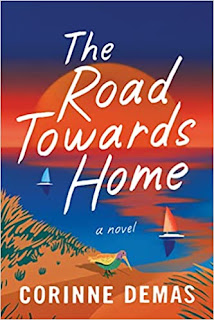 numerous books for children. She is a professor emeritus of English at Mount Holyoke College and a fiction editor of the Massachusetts Review.
numerous books for children. She is a professor emeritus of English at Mount Holyoke College and a fiction editor of the Massachusetts Review.
She grew up in New York City, in Stuyvesant Town, the subject of her memoir, Eleven Stories High, Growing Up in Stuyvesant Town, 1948-1968. She attended Hunter College High School, graduated from Tufts University, and completed a Ph.D. in English and Comparative Literature at Columbia University. She lived in Pittsburgh for a number of years, teaching at the University of Pittsburgh and at Chatham College.
Demas applied the Page 69 Test to her new novel, The Road Towards Home, and reported the following:
From page 69:Visit Corinne Demas's website.“I gather they’ll be busing people to this other facility, Brookfield Village, to use the pool there.”The Page 69 Test works perfectly for The Road Towards Home. Page 69 includes an important plot element, gives readers a feel for the tone of the novel, and, most important, introduces the two main characters, Noah and Cassandra, and offers a taste of their witty banter.
“In that case I will take a hiatus from exercise,” said Noah. “I will not be bused anywhere.”
“I believe it’s a van, not a bus—”
“I will not be bused or van-ed.”
“I, at least, have an exercise plan that is unaffected by renovations,” said Cassandra. The exercise plan, suddenly fearing he was going to be cheated out of his walk, started tugging on his leash, and Cassandra said, “We better get moving.”
The path along the river widened and narrowed for no apparent reason, so sometimes they walked side by side and sometimes one in front of the other. When Melville looked as if it was likely he was going to be doing something unattractive, Noah dropped farther behind or hurried ahead.
“Would you like to have the experience of walking him yourself?” asked Cassandra, offering Noah the leash.
“I will forego the pleasure for now, thank you, and, I might add, forever.”
“Others have had your response initially,” said Cassandra, “but in time enjoyed the opportunity.”
“Those were others,” said Noah. “Not I.”
When they returned to Cassandra’s apartment and Melville was safely stretched out on the floor by the faux fireplace, Noah sat in the chair where he’d sat before.
“I found some wine,” said Cassandra. “I was looking for a field guide on fungi, and there they were. I’d thought the box was books, but I was wrong.”
She handed the opener to Noah. “I’ll get the glasses.” In the kitchen she looked around for something to serve with the wine. The only cheese was a dismal scrap of cheddar, and the only crackers she could find were probably stale.
“Would you like some chocolate?”
When Cassandra and Noah meet at Clarion Court, a senior living community, they discover that they knew each other in college, fifty years ago, and their friendship is reignited in spite of their striking differences. Cassandra is an entomologist, and Noah is uneasy with insects; Noah, a retired English professor plays the cello, and Cassandra admits to not liking music. They are two fiercely independent septuagenarians who are attracted to each other but carry baggage of their past marriages and their complex relationships with their children and their siblings. Both of them are critical of life at Clarion Court, and when renovations include closure of the pool—a favorite amenity--they are inspired to decamp and set off together to Noah’s cottage on Cape Cod.
The scene on page 69 takes place in Cassandra’s Clarion Court apartment, and her character is revealed through details like her uncovering the wine bottles when she was “looking for a field guide on fungi,” and the food she offers Noah: “The only cheese was a dismal scrap of cheddar, and the only crackers she could find were probably stale.”
The Road Towards Home relies on dialogue, and page 69 showcases the distinct voices of this unlikely pair, and how they play off each other. When Noah says he will not be “bused” anywhere, Cassandra points out that “it’s a van, not a bus.” When Noah responds, “I will not be bused or van-ed” Cassandra ignores his clever neologism and says “I, at least, have an exercise plan that is unaffected by renovations.” Her Newfoundland Melville, the “exercise plan” on a leash, is a source of humorous conflict between them throughout the novel.
--Marshal Zeringue





